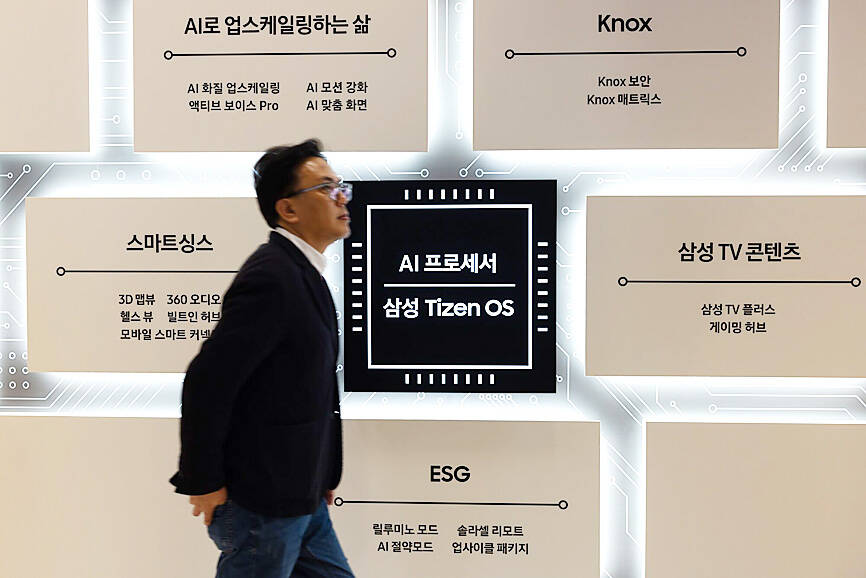The US plans to award more than US$6 billion to Samsung Electronics Co, helping the chipmaker expand beyond a project in Texas it has already announced, people familiar with the matter said.
The money from the 2022 CHIPS and Science Act would be one of several major awards that the US Department of Commerce is expected to announce in the coming weeks, including a grant of more than US$5 billion to Samsung’s rival, Taiwan Semiconductor Manufacturing Co (TSMC, 台積電), people familiar with the plans said.
The people spoke on condition of anonymity in advance of the official announcements.

Photo: Bloomberg
The federal funding for Samsung, South Korea’s leading chipmaker, would come alongside significant additional US investment by the firm, the sources said.
In 2021, the company announced a US$17 billion project in Taylor, Texas, near an existing plant in Austin. It is not yet clear where the additional investment would be located.
The pending announcement only represents a preliminary agreement that could still change, and no final decision has been made. Samsung and the US Department of Commerce declined to comment, while the White House did not respond to a request for comment.
The CHIPS Act set aside US$39 billion in direct grants — plus loans and loan guarantees valued at US$75 billion — to persuade the world’s top semiconductor companies to make chips on US soil after decades of production abroad.
The US Department of Commerce earlier announced three CHIPS Act grants to producers of older-generation semiconductors.
Officials have been negotiating for months with makers of cutting-edge chips that would fuel the artificial intelligence boom, and have set aside about US$28 billion for those advanced projects, US Secretary of Commerce Gina Raimondo has said.
Intel Corp — the main US competitor to Samsung and TSMC — has been in talks for a CHIPS Act package of more than US$10 billion spanning grants and loans. Intel’s incentive deal is expected to be announced next week, with the other advanced chipmakers set to follow, one of the people said.
It is not clear whether companies beyond Intel are in line to receive loans or financing guarantees. Samsung has indicated that it is not interested in loans, the sources said.
There is also the separate issue of US$3.5 billion in CHIPS Act grants for production of military chips — money that is expected to go to Intel and has thrown a wrench in negotiations over the past few weeks after the Pentagon pulled out from its portion of the funding.
Samsung previously said its Taylor site is slated to begin mass production this year, but that timeline is reportedly being delayed to next year. Company officials have since said that they cannot confirm the mass production schedule.
Samsung has touted its economic impact on the Austin region in Texas, which rose to US$26.8 billion last year from US$13.6 billion the year before, according to a third-party report the firm published last month.

The US dollar was trading at NT$29.7 at 10am today on the Taipei Foreign Exchange, as the New Taiwan dollar gained NT$1.364 from the previous close last week. The NT dollar continued to rise today, after surging 3.07 percent on Friday. After opening at NT$30.91, the NT dollar gained more than NT$1 in just 15 minutes, briefly passing the NT$30 mark. Before the US Department of the Treasury's semi-annual currency report came out, expectations that the NT dollar would keep rising were already building. The NT dollar on Friday closed at NT$31.064, up by NT$0.953 — a 3.07 percent single-day gain. Today,

‘SHORT TERM’: The local currency would likely remain strong in the near term, driven by anticipated US trade pressure, capital inflows and expectations of a US Fed rate cut The US dollar is expected to fall below NT$30 in the near term, as traders anticipate increased pressure from Washington for Taiwan to allow the New Taiwan dollar to appreciate, Cathay United Bank (國泰世華銀行) chief economist Lin Chi-chao (林啟超) said. Following a sharp drop in the greenback against the NT dollar on Friday, Lin told the Central News Agency that the local currency is likely to remain strong in the short term, driven in part by market psychology surrounding anticipated US policy pressure. On Friday, the US dollar fell NT$0.953, or 3.07 percent, closing at NT$31.064 — its lowest level since Jan.

The New Taiwan dollar and Taiwanese stocks surged on signs that trade tensions between the world’s top two economies might start easing and as US tech earnings boosted the outlook of the nation’s semiconductor exports. The NT dollar strengthened as much as 3.8 percent versus the US dollar to 30.815, the biggest intraday gain since January 2011, closing at NT$31.064. The benchmark TAIEX jumped 2.73 percent to outperform the region’s equity gauges. Outlook for global trade improved after China said it is assessing possible trade talks with the US, providing a boost for the nation’s currency and shares. As the NT dollar

The Financial Supervisory Commission (FSC) yesterday met with some of the nation’s largest insurance companies as a skyrocketing New Taiwan dollar piles pressure on their hundreds of billions of dollars in US bond investments. The commission has asked some life insurance firms, among the biggest Asian holders of US debt, to discuss how the rapidly strengthening NT dollar has impacted their operations, people familiar with the matter said. The meeting took place as the NT dollar jumped as much as 5 percent yesterday, its biggest intraday gain in more than three decades. The local currency surged as exporters rushed to